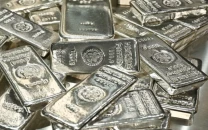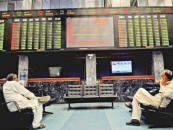Weekly review: KSE-100 index falls 1,008 points amid economic tensions
Lack of clarity on IMF loan and deteriorating macroeconomic indicators lead to bearish trade

Lack of clarity on IMF loan and deteriorating macroeconomic indicators lead to bearish trade. PHOTO: FILE
Despite some results of the outgoing quarter being above market expectations in sectors of banks, cements and chemicals, the investors continued to remain cautious over the ongoing economic situation. Teams of Pakistan and the International Monetary Fund have been locked in negotiations for the past six days. Lack of clarity over finalisation of the programme led to the persistent selling pressure as the index finished all four sessions in red.
The stock market began the week on a negative note, a trend which continued in the following session. An IMF report, predicting a slowdown in the country’s economy further dented sentiments and the dragged the index below the significant barrier of 37,000 points.
Market watch: KSE-100 loses ground for third successive session
Although the market remained closed on Wednesday on account of Labour Day, there was no respite in selling pressure as investors chose to offload stocks on fears of strict IMF conditions and a tough upcoming budget. Concerns over the deteriorating macroeconomic indicators also added to the pressure. Stocks were battered on the last trading day of the week as the index slumped 425 points, on reports of IMF’s demand for a 25% increase in power tariff.
Participation slowed during the week as volumes were down 14% to 105 million, while the value traded clocked in at $29 million.
In terms of sectors, negative contribution came from oil and gas exploration companies (down 308 points) amid fall in international oil prices, commercial banks (171 points), fertilisers (148 points), power generation and distribution (89 points) and oil and gas marketing companies (70 points).
On the flip side, sectors that contributed positively include tobacco (up 27 points) and insurance (5 points).
Scrip-wise negative contribution came from PPL (down 125 points), OGDC (90 points), POL (78 points) and HBL (73 points). Meanwhile, PSMC (up 24 points), PMPK (20 points), HMB (12 points) and PAKT (7 points) contributed to the index.
Foreign buying continued this week clocking-in at $4.8 million compared to a net buy of $9.3 million last week. Buying was witnessed in cements ($3.9 million) and commercial banks ($2 million). On the domestic front, major selling was reported by mutual funds ($13.4 million) and broker proprietary trading ($0.6 million). On the other hand, banks were net buyers of $1.71 million while individuals were net buyers of $2.2 million.
Other major news of the week was: Cabinet committees dealing with economic matters reconstituted, FTA Phase-II signed with China, Rs9.54 per litre increase in petrol price, talks on $8 billion bailout between government and IMF in final round, CPI-based inflation recorded at 8.8% in April, and foreign exchange reserves held by the SBP dipped 2.4% to stand at $8.8b.
Published in The Express Tribune, May 5th, 2019.
Like Business on Facebook, follow @TribuneBiz on Twitter to stay informed and join in the conversation.


















COMMENTS
Comments are moderated and generally will be posted if they are on-topic and not abusive.
For more information, please see our Comments FAQ